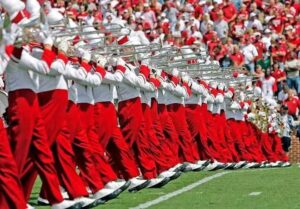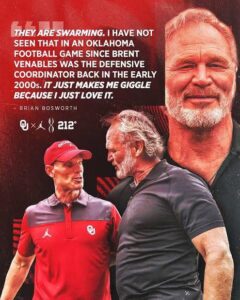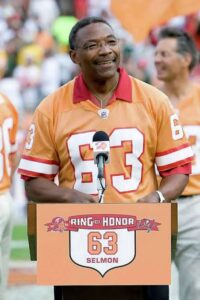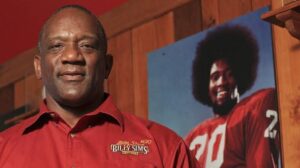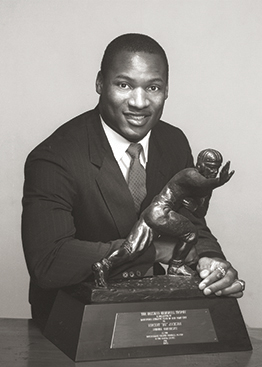
Bo Jackson: The Greatest College Football Player of All Time
In the world of college football, there are few names that resonate as powerfully as Bo Jackson. His legendary status has been cemented in history not just because of his athletic abilities, but because of the unique combination of skill, dominance, and cultural impact that he brought to the game. When Bo Jackson was recently voted the greatest college football player of all time, surpassing other football icons like Tim Tebow, Herschel Walker, Barry Sanders, and Earl Campbell, it wasn’t just a victory for his career, but a testament to his unmatched versatility and unforgettable moments on the field.
Jackson’s legacy continues to captivate fans even decades after he played, and it’s clear that his unparalleled combination of power, speed, and vision remains unmatched in the annals of college football history. But to understand why Jackson’s reign as the greatest is so revered, it’s important to examine his college football career, his impact on the sport, and how his persona extended beyond the field.
Bo Jackson’s story began in Bessemer, Alabama, where he was born in 1962. Growing up in a modest household, Jackson exhibited remarkable athletic talent at an early age. He became known not only for his extraordinary football skills but also for his ability in baseball, which would later define his career. His prowess in multiple sports eventually led to one of the most unique and iconic athletic careers in history.
However, it was on the football field where Jackson first began to capture the imaginations of fans. At Auburn University, Jackson quickly became a force to be reckoned with, leading the Tigers’ offense with his explosive speed and immense power. Bo’s combination of size—standing at 6’1” and weighing 230 pounds—and a remarkable top-end speed was almost mythical in nature. This blend of attributes is what set him apart from other players, and it was during his time in college that Jackson began to rewrite the rules of what a running back could be.
Jackson was recruited to Auburn by legendary coach Pat Dye, and his time there was nothing short of extraordinary. His sophomore year was a breakout campaign, but it was his junior and senior seasons that truly cemented his legacy. In 1985, he led the NCAA in rushing yards and touchdowns, putting together some of the most iconic performances in college football history. Jackson’s stiff arm became a signature move, leaving defenders in his wake as he powered his way through tackles with ease.
Bo Jackson’s most memorable college football moments include a series of performances that seemed almost too good to be true. In a game against Alabama in 1982, Jackson displayed his uncanny ability to break through tackles, running for 256 yards and scoring two touchdowns. His 4.1-second 40-yard dash was a rare testament to his pure athleticism, and the visual of him breaking free from defenders remains one of the most iconic moments in college football.
But Jackson’s true brilliance didn’t just lie in his physicality. He also had the vision and agility of a skilled back, often weaving his way through defenders with precise footwork and patience. In a game against Florida in 1983, Jackson amassed 144 rushing yards and scored a stunning touchdown that showcased his athletic grace and awareness.
Perhaps his most significant and definitive moment came in 1985, when Jackson became the first player in college football history to win the prestigious Heisman Trophy while playing on an Auburn team that finished with a 10-1-1 record. Jackson’s blend of speed, strength, and vision made him a problem for opposing defenses, and his Heisman Trophy was a recognition of just how dominant he was on the college football field. Jackson’s achievements helped propel Auburn into national recognition, and his performance on the field helped solidify the program as a force to be reckoned with in college football.
While Jackson’s career is revered for its excellence, the competition for the title of greatest college football player is fierce. Other players such as Tim Tebow, Herschel Walker, Barry Sanders, and Earl Campbell are all frequently mentioned in conversations about who should be considered the best of all time.
Tim Tebow, the quarterback for the Florida Gators from 2006 to 2009, was a dual-threat player who dominated college football during his tenure. A two-time national champion and the first sophomore to win the Heisman Trophy, Tebow’s impact on the game was undeniable. Known for his toughness, leadership, and strong arm, Tebow was the face of a Florida program that consistently competed for national titles. His legacy is certainly one of greatness, but what sets Bo Jackson apart from Tebow and other quarterbacks is Jackson’s ability to impact the game as a pure athlete in a way that few can match. Jackson was an unstoppable force as a running back, capable of running past defenders with breakaway speed and running over them with brute strength. While Tebow’s legacy is that of a dynamic quarterback who was a symbol of college football, Jackson’s unique blend of athleticism across multiple sports is what makes him stand out as the greatest.
Herschel Walker, the Georgia Bulldog and 1982 Heisman Trophy winner, was another player whose dominance on the field was undeniable. Walker, a powerful runner with the agility of a much smaller player, helped lead Georgia to a national title and solidified his legacy as one of the best to ever play the game. Like Jackson, Walker had rare physical attributes that made him a threat to opposing defenses. He was known for his consistency, his ability to break tackles, and his reputation as one of the most hard-hitting players to ever wear a college football uniform. While Walker’s career was storied, Bo Jackson’s versatility and his impact on the sport in multiple realms (football and baseball) allowed him to maintain an edge over the greats.
Barry Sanders is another name that often comes up in these discussions, and for good reason. Sanders had one of the most electrifying college football careers in history, including a 1988 season at Oklahoma State where he set an NCAA record for rushing yards in a single season. Sanders’ cutting ability and vision were second to none, and his agility and quickness made him an elusive threat every time he touched the ball. His performances were often dazzling and jaw-dropping, leaving defenders in the dust. Sanders’ single-season rushing total of 2,628 yards stands as one of the most impressive feats in college football history. However, while Sanders’ career was legendary, Jackson’s dominance in both football and baseball gives him a unique place in the sports pantheon.
Earl Campbell, who played for the Texas Longhorns from 1974 to 1977, is another player who belongs in the conversation about the greatest college football player. Known for his explosive power, Campbell was one of the hardest runners the sport has ever seen. His ability to run over defenders and his success in leading Texas to a national championship were a testament to his strength and skill. Like Jackson, Campbell was a physical presence on the field, but Bo’s dual-sport exploits add another layer to his legacy.
Bo Jackson’s legacy transcends his college football achievements. His time at Auburn was just the beginning of what would become an extraordinary career in both football and baseball. Jackson’s unique ability to play at the highest level in two professional sports simultaneously—baseball with the Kansas City Royals and football with the Los Angeles Raiders—made him a true sports icon. His Nike commercials, particularly the famous “Bo Knows” campaign, helped to cement his place as one of the most recognizable and marketable athletes of his generation.
In baseball, Jackson’s raw power and athleticism were on full display. He hit 32 home runs in one season and earned an All-Star appearance in 1989. His ability to switch between football and baseball at the highest levels was something that no other player in the modern era had done. But it was Jackson’s untimely hip injury in 1991 that ultimately cut his career short in both sports. Still, his impact on college football, baseball, and sports in general cannot be understated.
Bo Jackson’s legacy lives on not just in the records he set, but in the standard he set for what an athlete can achieve. He was a pioneer in dual-sport careers and a beacon of athletic excellence. He remains a cultural icon—his highlight-reel moments from his college career are still replayed, and his name continues to be invoked in discussions about the greatest athletes of all time.
Bo Jackson’s recent recognition as the greatest college football player of all time is a fitting tribute to a career that transcended sports and left a lasting mark on the world. While players like Tim Tebow, Herschel Walker, Barry Sanders, and Earl Campbell each had phenomenal careers, Jackson’s versatility, dominance, and cultural impact make him stand above the rest.
His time at Auburn, his success in both football and baseball, and the sheer awe he inspired in fans and opponents alike helped create a legacy that will never be forgotten. Bo Jackson wasn’t just a great college football player—he was a revolutionary force in sports, showing the world what true athleticism could look like. As time moves forward, it’s clear that his place in the history of college football will forever be secured as one of the greatest to ever play the game.

